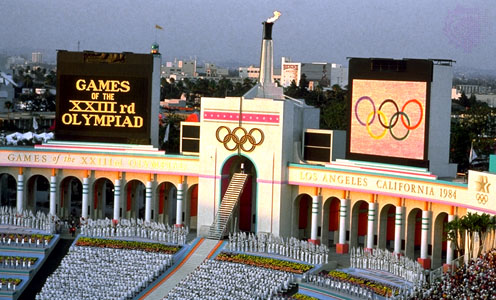HISTORY OF THE MODERN OLYMPICS
Los Angeles, California, U.S., 1984
| Olympic posters from the Archives, Olympic Museum Lausanne, from the book The Olympic Spirit, published by Tehabi Books |
As in 1980, a boycott resulted in an unbalanced distribution of medals. At the 1984 Games the U.S. team benefited most, capturing 83 gold medals and 174 medals altogether. The track-and-field competition returned to the Memorial Coliseum, which had been renovated for the Games. American Carl Lewis, competing in the same events as Jesse Owens in 1936, won four gold medals. Sebastian Coe and Daley Thompson of the United Kingdom each repeated their gold medal performances of 1980, winning in the 1,500-metre run and the decathlon, respectively.
 |
| Opening ceremonies, Los Angeles, 1984 |
| Steve Powell--Allsport |
The U.S. women's team won 11 of the 14 swimming events. Mary T. Meagher and Tracy Caulkins each earned three gold medals. American Greg Louganis swept the diving events. With the powerful Eastern European teams absent, the U.S. men's and women's gymnastic teams had their best Olympic showing ever. Mary Lou Retton became the first American woman to capture the individual gold medal in the combined exercises. Without the challenge of the Cuban boxing team, the U.S. team dominated the competition, earning nine gold medals.
Introduction * Early History * Revival of the Olympics * Organization of the Modern Games